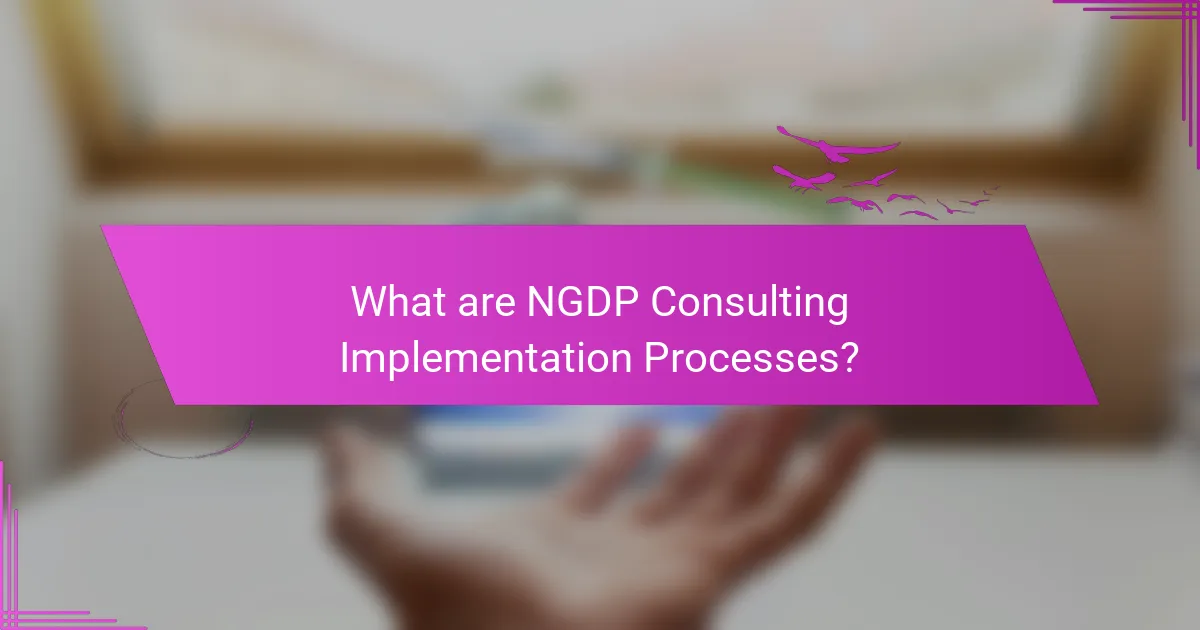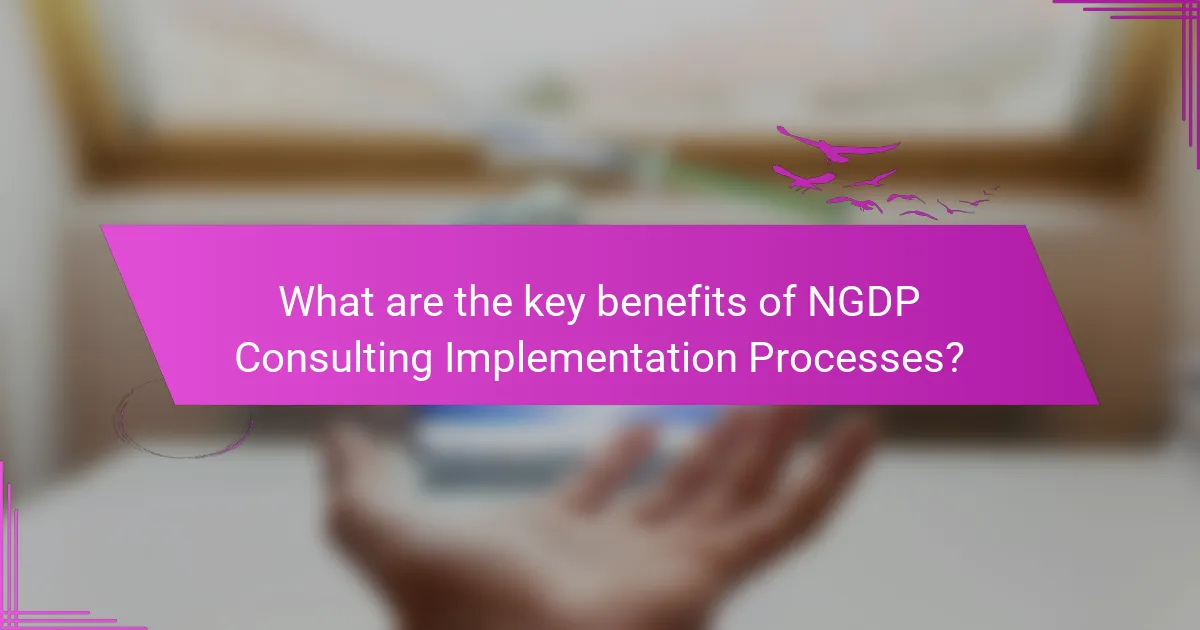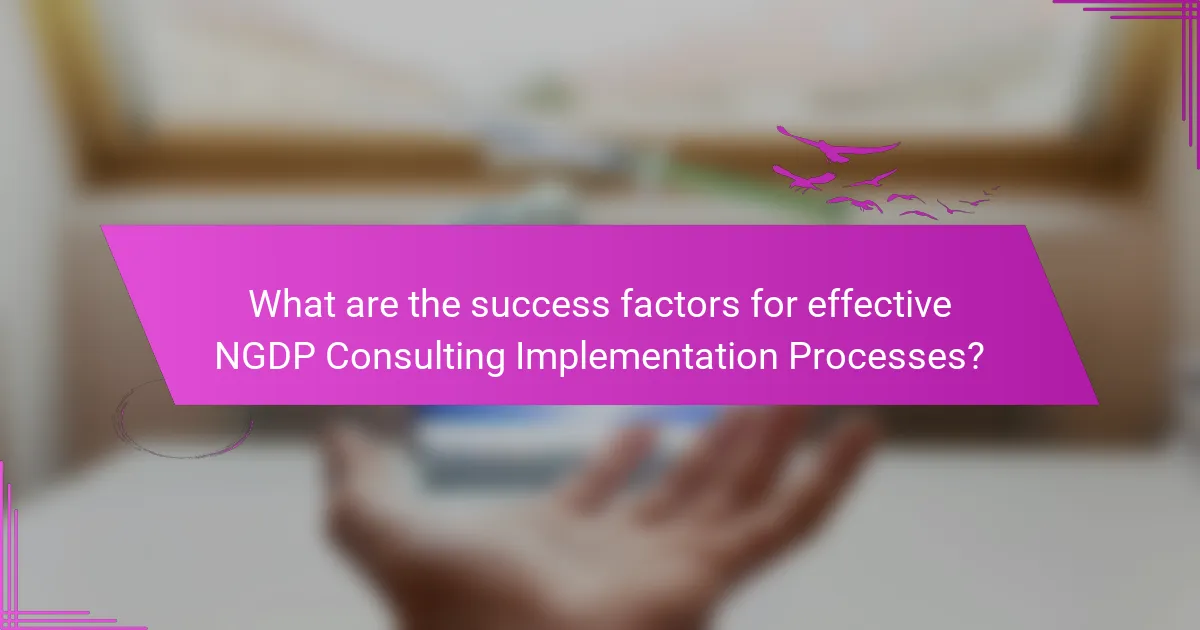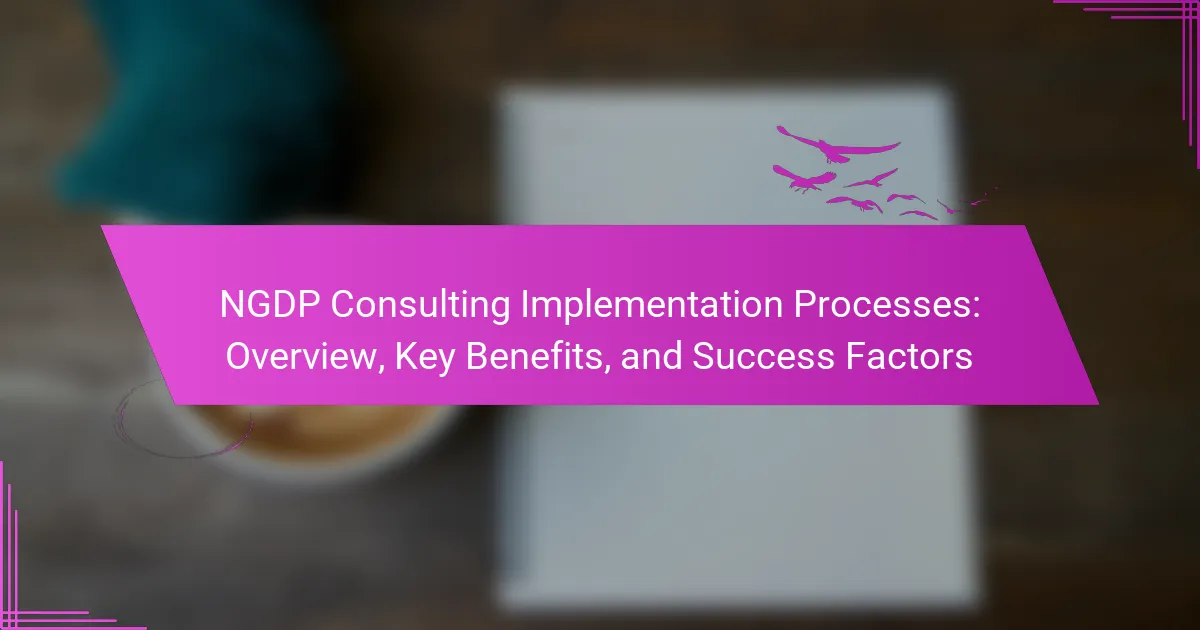
What are NGDP Consulting Implementation Processes?
NGDP Consulting Implementation Processes refer to the structured methodologies used by NGDP Consulting to execute projects. These processes typically include phases such as assessment, planning, execution, and evaluation. Each phase is designed to ensure that client objectives are met efficiently. The assessment phase identifies client needs and challenges. During planning, strategies are developed to address these needs. Execution involves implementing the strategies in a systematic manner. Finally, evaluation measures the success of the implementation against predefined goals. These processes are crucial for achieving desired outcomes and ensuring client satisfaction.
How do NGDP Consulting Implementation Processes function?
NGDP Consulting Implementation Processes function through a structured approach that ensures effective project execution. These processes begin with a thorough assessment of client needs and objectives. This assessment helps in tailoring solutions that align with specific business goals. Next, NGDP Consulting develops a detailed implementation plan. This plan outlines timelines, resources, and key milestones for the project.
The execution phase involves deploying the necessary resources and teams to implement the plan. Continuous monitoring and evaluation are integral to this phase. This ensures that the project stays on track and adjustments can be made as needed. Finally, the process concludes with a review and feedback session. This step assesses the outcomes against the initial objectives, ensuring accountability and learning for future projects.
What are the key stages in NGDP Consulting Implementation Processes?
The key stages in NGDP Consulting Implementation Processes include assessment, planning, execution, monitoring, and evaluation. Assessment involves identifying organizational needs and challenges. Planning focuses on developing strategies and resources required for implementation. Execution is the stage where the planned strategies are put into action. Monitoring tracks progress and ensures adherence to the plan. Evaluation assesses the outcomes and effectiveness of the implemented strategies. Each stage is critical for successful consulting outcomes and aligns with best practices in project management.
What roles do stakeholders play in these processes?
Stakeholders play crucial roles in NGDP consulting implementation processes. They provide input, resources, and support that are essential for successful execution. Stakeholders include clients, team members, and external partners. Each stakeholder contributes unique perspectives and expertise. Clients define project goals and expectations, guiding the consulting team. Team members execute tasks and provide insights based on their experiences. External partners may offer additional resources or knowledge. Their involvement fosters collaboration and alignment across all parties. Effective stakeholder engagement enhances project outcomes and drives success in implementation processes.
Why are NGDP Consulting Implementation Processes important?
NGDP Consulting Implementation Processes are important because they ensure effective execution of strategies. These processes align organizational goals with actionable steps. They facilitate communication and collaboration among stakeholders. Efficient implementation minimizes risks associated with project failures. Data-driven methodologies enhance decision-making and resource allocation. Successful implementation increases the likelihood of achieving desired outcomes. Evidence shows that structured processes can improve project success rates by up to 30%. This highlights their critical role in organizational effectiveness and growth.
What are the primary benefits of utilizing NGDP Consulting Implementation Processes?
The primary benefits of utilizing NGDP Consulting Implementation Processes include enhanced efficiency, improved project outcomes, and streamlined communication. These processes help organizations reduce implementation time by utilizing established frameworks. They also increase the likelihood of achieving project goals through structured methodologies. Additionally, NGDP Consulting fosters collaboration among team members, leading to better problem-solving. Enhanced stakeholder engagement is another significant benefit, as these processes ensure that all parties are informed and involved. Furthermore, utilizing data-driven decision-making enhances the quality of outcomes. Overall, these benefits contribute to a more successful implementation experience.
How do these processes contribute to organizational success?
NGDP Consulting implementation processes contribute to organizational success by enhancing efficiency and effectiveness. These processes streamline operations by reducing redundancies and optimizing resource allocation. They foster clear communication among teams, which improves collaboration and decision-making. By implementing best practices, organizations can adapt to changing market conditions swiftly. This adaptability is crucial for maintaining competitive advantage. Additionally, these processes enable better tracking of performance metrics. Improved metrics support informed strategic planning and goal setting. Research indicates that organizations employing structured implementation processes experience higher project success rates, reinforcing their overall performance.

What are the key benefits of NGDP Consulting Implementation Processes?
The key benefits of NGDP Consulting Implementation Processes include enhanced operational efficiency and improved project outcomes. These processes streamline workflows, reducing redundancies and saving time. They facilitate better communication among stakeholders, which leads to clearer project goals. Additionally, they support data-driven decision-making, allowing for more informed strategies. The implementation processes are designed to be adaptable, catering to various organizational needs. Evidence from case studies shows that companies using these processes experience a significant increase in project success rates. This is backed by research indicating that structured implementation leads to higher client satisfaction and retention.
How do NGDP Consulting Implementation Processes enhance efficiency?
NGDP Consulting Implementation Processes enhance efficiency by streamlining workflows and optimizing resource allocation. These processes employ a systematic approach to project management, ensuring that tasks are prioritized effectively. This prioritization reduces delays and minimizes wasted time. Additionally, NGDP’s methodologies incorporate data-driven decision-making. This enables teams to identify bottlenecks and address them promptly. The use of technology further automates repetitive tasks, freeing up human resources for more strategic activities. According to industry studies, organizations that implement structured processes see a productivity increase of up to 30%. This quantifiable improvement underscores the effectiveness of NGDP’s approach to enhancing operational efficiency.
What specific improvements can organizations expect?
Organizations can expect enhanced operational efficiency through NGDP Consulting implementation processes. These processes streamline workflows and reduce redundancies. Improved data management leads to better decision-making. Organizations often see increased employee productivity as a result of clearer roles and responsibilities. Enhanced customer satisfaction is also common, stemming from more responsive service delivery. Additionally, organizations report higher profitability due to optimized resource allocation. A study by the Project Management Institute shows that effective implementation can lead to a 20% increase in project success rates. These improvements collectively contribute to sustainable growth and competitive advantage.
How do these processes streamline communication?
These processes streamline communication by enhancing clarity and reducing misunderstandings. They establish standardized protocols for information sharing. This ensures that all team members receive consistent messages. Additionally, they utilize collaborative tools that facilitate real-time feedback. Such tools help in quickly addressing questions or concerns. Furthermore, these processes encourage regular updates and check-ins. This proactive approach keeps everyone informed about project progress. Studies show that streamlined communication can increase team productivity by up to 25%.
What cost savings can be achieved through NGDP Consulting Implementation Processes?
NGDP Consulting Implementation Processes can achieve significant cost savings through streamlined operations. By optimizing resource allocation, organizations can reduce waste and increase efficiency. Implementing best practices leads to lower operational costs. Enhanced project management minimizes delays, which further cuts expenses. Data-driven decision-making allows for better financial forecasting and budgeting. Companies have reported savings of up to 30% in project costs post-implementation. Additionally, improved employee productivity translates into financial benefits. Overall, these processes contribute to a more cost-effective business model.
What factors contribute to cost reduction?
Cost reduction is influenced by several key factors. Efficient resource management minimizes waste and lowers expenses. Streamlining processes enhances productivity and reduces labor costs. Negotiating better supplier contracts can lead to lower material costs. Adopting technology can automate tasks, decreasing operational costs. Implementing energy-saving measures reduces utility expenses significantly. Regularly reviewing financial performance identifies areas for further savings. Training staff improves efficiency, leading to cost reductions. These factors collectively contribute to substantial cost savings for organizations.
How can organizations measure these savings?
Organizations can measure savings through detailed financial analysis and performance metrics. They should track key performance indicators (KPIs) before and after implementation. This includes cost reductions, efficiency gains, and time savings. Comparing these metrics provides a clear picture of financial impact. For instance, organizations can analyze operational costs over specific periods. They can also assess productivity improvements through employee output data. Additionally, benchmarking against industry standards can validate savings claims. Using software tools for data analysis enhances accuracy. Regular audits ensure sustained savings are maintained over time.

What are the success factors for effective NGDP Consulting Implementation Processes?
Effective NGDP Consulting Implementation Processes rely on clear communication, stakeholder engagement, and tailored strategies. Clear communication ensures all parties understand objectives and expectations. Stakeholder engagement fosters collaboration and buy-in, which is crucial for success. Tailored strategies adapt to the unique needs of the organization, enhancing relevance and effectiveness. Continuous evaluation and feedback loops allow for adjustments and improvements throughout the process. Strong leadership provides direction and motivation, driving the implementation forward. Lastly, leveraging data analytics supports informed decision-making, optimizing outcomes. These factors collectively contribute to the successful implementation of NGDP Consulting processes.
How does leadership influence the success of NGDP Consulting Implementation Processes?
Leadership significantly influences the success of NGDP Consulting Implementation Processes. Effective leadership sets a clear vision and strategic direction for the implementation. Leaders foster a culture of collaboration and accountability among team members. They also ensure that resources are allocated efficiently to meet project goals. Strong leadership enhances communication, which is crucial for addressing challenges promptly. According to a study by the Project Management Institute, projects with effective leadership are 30% more likely to succeed. Therefore, leadership plays a critical role in guiding NGDP Consulting through successful implementation processes.
What leadership qualities are essential for success?
Effective leadership qualities essential for success include vision, communication, empathy, and decisiveness. Vision allows leaders to set clear goals and inspire teams. Communication ensures that ideas and expectations are conveyed effectively. Empathy helps leaders understand team members’ perspectives and foster collaboration. Decisiveness enables leaders to make timely and informed decisions. Research by Zenger & Folkman (2019) shows that these qualities significantly impact team performance and organizational success.
How can leaders foster a culture of collaboration?
Leaders can foster a culture of collaboration by promoting open communication. They should encourage team members to share ideas and feedback. Regular team meetings can facilitate this exchange. Leaders must also model collaborative behavior themselves. By participating in teamwork, they set a standard for others. Providing collaborative tools and resources is essential. Technology can enhance communication and project management. Additionally, recognizing and rewarding collaborative efforts reinforces this culture. Studies show that organizations with strong collaboration see increased productivity and employee satisfaction.
What role does training play in successful NGDP Consulting Implementation Processes?
Training is essential for successful NGDP Consulting Implementation Processes. It equips team members with necessary skills and knowledge. Training ensures alignment with project goals and methodologies. It fosters effective communication among stakeholders. Well-trained personnel can identify and resolve issues promptly. Research indicates that organizations with comprehensive training programs see higher project success rates. For instance, a study by the Project Management Institute found that effective training improves project outcomes by up to 20%. Thus, training significantly enhances the overall effectiveness of NGDP consulting implementations.
What types of training are most effective?
Effective training types include experiential learning, coaching, and online training. Experiential learning engages participants through hands-on experiences. This approach enhances retention and application of skills. Coaching provides personalized feedback and support, improving individual performance. Online training offers flexibility and accessibility, allowing learners to progress at their own pace. Research indicates that blended learning, combining multiple training methods, yields the best results. A study by the Association for Talent Development found that organizations using blended learning saw a 20% increase in employee performance. Thus, integrating various training types maximizes effectiveness.
How can organizations ensure ongoing support and development?
Organizations can ensure ongoing support and development by implementing structured feedback mechanisms. Regular assessments can identify areas needing improvement. Training programs should be continuously updated to reflect industry changes. Mentorship initiatives can foster knowledge sharing among employees. Clear communication channels must be established to facilitate dialogue. Performance metrics should be monitored to evaluate progress effectively. Investing in technology can streamline support processes. Research indicates that companies with robust support systems see a 25% increase in employee satisfaction (Gallup, 2021).
What best practices should organizations follow for NGDP Consulting Implementation Processes?
Organizations should follow structured methodologies for NGDP Consulting Implementation Processes. This includes defining clear objectives at the outset. Establishing a project timeline ensures all stakeholders are aligned. Engaging stakeholders throughout the process fosters collaboration and buy-in. Regular progress assessments allow for timely adjustments to strategies. Utilizing data-driven decision-making enhances the effectiveness of implementations. Training and support for staff are crucial for adoption and sustainability. Documenting lessons learned helps refine future implementation efforts. These practices lead to more successful outcomes in consulting projects.
How can organizations effectively evaluate their implementation strategies?
Organizations can effectively evaluate their implementation strategies by establishing clear performance metrics. These metrics should align with the organization’s goals and objectives. Regular monitoring of these metrics allows for timely adjustments. Feedback from stakeholders is also crucial in this process. Surveys and interviews can provide insights into the effectiveness of the strategies. Additionally, comparative analysis against industry benchmarks can highlight areas for improvement. Organizations should document lessons learned throughout the evaluation process. This documentation aids in refining future strategies.
What common challenges should organizations anticipate, and how can they be addressed?
Organizations should anticipate challenges such as resistance to change, lack of stakeholder engagement, and inadequate training. Resistance to change can hinder implementation efforts. To address this, organizations can foster a culture of open communication and involve employees in the change process. Lack of stakeholder engagement can lead to misalignment of goals. Organizations should ensure regular updates and feedback loops with stakeholders. Inadequate training can result in poor adoption of new processes. Providing comprehensive training programs and ongoing support can mitigate this issue. According to a study by Prosci, 70% of change initiatives fail due to lack of employee engagement. This underscores the importance of addressing these challenges proactively.
NGDP Consulting Implementation Processes are structured methodologies utilized to execute projects efficiently. This article provides an overview of these processes, detailing key stages such as assessment, planning, execution, and evaluation, along with their importance in achieving client objectives. It highlights the roles of stakeholders, the benefits of enhanced efficiency and communication, and the significance of leadership and training in successful implementation. Additionally, the article addresses cost savings, common challenges, and best practices for organizations to follow, ultimately emphasizing the impact of these processes on organizational success and project outcomes.
